Harry Potter and the Chamber of Secrets Review
Review by Christopher G. Nuttall
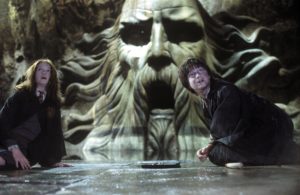
Harry Potter and the Chamber of Secrets holds a special place in my heart as it was the first of the Harry Potter books I actually read – and, in many ways, I think it is still the best. It is relatively self-contained, while introducing new characters and setting up plenty of future events for later development And yet, it also seems strikingly childish in places. There are aspects of the plotting which make adults roll their eyes.
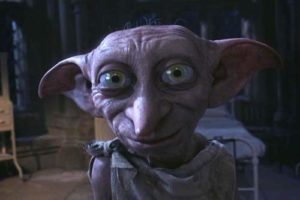 Harry is back at his aunt and uncle’s house for the summer, where Uncle Vernon has an important business dinner (which I will discuss below.) Told firmly to stay in his room, which he does, Harry is confronted by Dobby, an enigmatic House-Elf. Dobby warns Harry not to go back to Hogwarts, and just to make life harder for him, ruins the business dinner in a manner calculated to ensure that Harry gets the blame. His furious uncle locks him in his room after the dinner is over.
Harry is back at his aunt and uncle’s house for the summer, where Uncle Vernon has an important business dinner (which I will discuss below.) Told firmly to stay in his room, which he does, Harry is confronted by Dobby, an enigmatic House-Elf. Dobby warns Harry not to go back to Hogwarts, and just to make life harder for him, ruins the business dinner in a manner calculated to ensure that Harry gets the blame. His furious uncle locks him in his room after the dinner is over.
Fortunately for Harry, he is rescued by Ron and the Twins, who take him back to the Burrow for the rest of the summer. There, he meets Ginny – Ron’s younger sister – and, on an outing to London, Lucius Malfoy (Draco’s father). Less pleasantly, he also meets Gilderoy Lockhart, an overbearing celebrity writer. And, when he tries to catch the train back to Hogwarts, Harry and Ron are locked out of the train station. They have the bright idea of flying to Hogwarts in the flying car, rather than doing something sensible (like sending the owl with a message). Unluckily for them, they crash outside the school and are caught by Professor Snape.
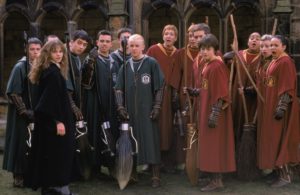 After a short telling-off by Dumbledore, the school year starts. Harry discovers, in short order, that Lockhart is now the Defence Against The Dark Arts teacher (and he’s a total fraud), that Draco has bribed his way onto the Slytherin team (Draco isn’t actually a bad player), that there’s an upswing in prejudice against Muggle-born wizards (like Hermione) and that there are mysterious voices echoing through the castle that only he can hear (which is not a good sign, even in the Wizarding World). It all culminates with a dark creature roving the corridors, petrifying students …
After a short telling-off by Dumbledore, the school year starts. Harry discovers, in short order, that Lockhart is now the Defence Against The Dark Arts teacher (and he’s a total fraud), that Draco has bribed his way onto the Slytherin team (Draco isn’t actually a bad player), that there’s an upswing in prejudice against Muggle-born wizards (like Hermione) and that there are mysterious voices echoing through the castle that only he can hear (which is not a good sign, even in the Wizarding World). It all culminates with a dark creature roving the corridors, petrifying students …
… And when the school discovers that Harry can talk to snakes, a talent shared by the original Slytherin and Lord Voldemort, he gets the blame.
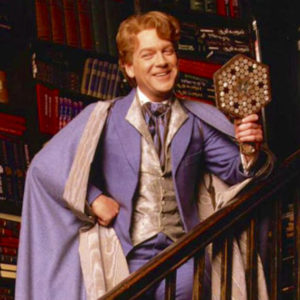 The school (save for Ron and Hermione) shuns Harry, even as they’re trying to cope with Lockhart’s idiocy. Eventually, Harry stumbles across a journal that can talk to whoever’s holding it. It claims to be the diary of Tom Riddle, who recounts for Harry how Hagrid (the gamekeeper, one of Harry’s friends) released the monster long ago. But it vanishes again, shortly before Hermione is petrified too. When Ginny is kidnapped, Dumbledore is removed as headmaster and Hogwarts is threatened with closure, Harry and Ron realise where the Chamber of Secrets is hidden and go after her. Along the way, they discover that Lockhart is a fraud who stole other people’s achievements and a cave-in separates them. Harry goes further into the Chamber, where he discovers … Tom Riddle. Riddle recounts how he, as a schoolboy, hid a memory of himself in the diary… before he grew up to be Voldemort.
The school (save for Ron and Hermione) shuns Harry, even as they’re trying to cope with Lockhart’s idiocy. Eventually, Harry stumbles across a journal that can talk to whoever’s holding it. It claims to be the diary of Tom Riddle, who recounts for Harry how Hagrid (the gamekeeper, one of Harry’s friends) released the monster long ago. But it vanishes again, shortly before Hermione is petrified too. When Ginny is kidnapped, Dumbledore is removed as headmaster and Hogwarts is threatened with closure, Harry and Ron realise where the Chamber of Secrets is hidden and go after her. Along the way, they discover that Lockhart is a fraud who stole other people’s achievements and a cave-in separates them. Harry goes further into the Chamber, where he discovers … Tom Riddle. Riddle recounts how he, as a schoolboy, hid a memory of himself in the diary… before he grew up to be Voldemort.
There is a brief, desperate fight between Harry, the monster – now revealed to be a basilisk – and Riddle, which ends when Harry destroys the diary. Ginny recovers, allowing Harry to take her back to the school. In Dumbledore’s office, with a little prompting from Dobby, Harry realises that Lucius Malfoy gave Ginny the diary right at the start. There’s no proof, but Harry tricks him into freeing Dobby anyway. And then he prepares to go back to his aunt and uncle …
***
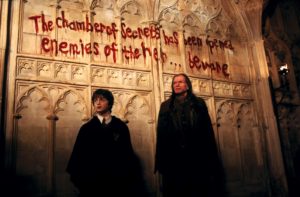 The thing that ran through my head, as I was compiling my notes on Chamber of Secrets, was an old sitcom called Keeping Up Appearances, featuring a lower-class woman trying to pretend that she’s posh (and everyone else attempting to avoid her). It’s striking to realise just how much the concept of keeping up appearances drives the plot, from Uncle Vernon setting up an important business dinner to Lockhart posing as a hero, Minister Fudge arresting Hagrid and Lucius Malfoy starting a plot that came far too close to killing Ginny and releasing a shadow of Lord Voldemort on the Wizarding World. Indeed, even Tom Riddle works hard to keep up appearances as he works to regain his power. The characters in this book are more focused on appearances, rather than reality.
The thing that ran through my head, as I was compiling my notes on Chamber of Secrets, was an old sitcom called Keeping Up Appearances, featuring a lower-class woman trying to pretend that she’s posh (and everyone else attempting to avoid her). It’s striking to realise just how much the concept of keeping up appearances drives the plot, from Uncle Vernon setting up an important business dinner to Lockhart posing as a hero, Minister Fudge arresting Hagrid and Lucius Malfoy starting a plot that came far too close to killing Ginny and releasing a shadow of Lord Voldemort on the Wizarding World. Indeed, even Tom Riddle works hard to keep up appearances as he works to regain his power. The characters in this book are more focused on appearances, rather than reality.
Indeed, it is this that gets them into trouble. Vernon’s focus on the dinner, and impressing his guests, gives Dobby a chance to ruin it. Lockhart gets exposed when he makes it blatantly clear that he’s no hero (and he isn’t even an skilful wizard). Minister Fudge shows the core of weakness at his heart when he orders an innocent man sent to jail. Tom Riddle would have managed to reincorporate in peace if he hadn’t left a message to taunt Ginny’s relatives. And Lucius Malfoy not only risked discovery, he risked his master’s anger. Given what the diary actually was, Lord Voldemort would be furious when he finally found out what happened to it.
And yet, all of these problems are firmly rooted in circumstances beyond their control.
I mentioned in the last review that Harry genuinely was a burden for the Dursleys. I suspect I didn’t make it clear. There are good reasons to believe that Uncle Vernon and his family are not particularly rich. Their attitude, in particular, is more like someone who is trying desperately to keep up appearances rather than someone who is genuinely secure. I suspect they probably have a large mortgage (houses in that part of the country are expensive), they’re probably saving to put Dudley through boarding school (also expensive) and, at that time, the economy was fluctuating dangerously. The reason for their desperation for everything to go perfectly, at the dinner, could be because the dinner really was that important. And Dobby may have cost them badly when he ruined it.
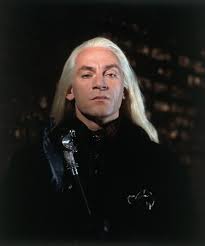 Something of the same could be said for Lucius Malfoy. His power and position were under threat at the start of the book, thanks to Arthur Weasley. Unleashing the diary on Ginny – an act he came to regret when You-Know-Who found out – was a desperate gamble to discredit Arthur before it was too late. Indeed, there are fans who argue that Lucius is nowhere near as rich as he claims and there is a great deal of evidence to support that claim in this book. Lucius may well be trying to make a show of wealth – by buying Draco a place on the Slytherin team – to hide the fact he has very little free cash. (Although it is fairly clear that Draco is not a bad player.) It’s quite possible that most of Lucius’s possessions – his mansion, for example – are entailed. He simply cannot sell them to raise money, as they have to be passed down to his descendents intact.
Something of the same could be said for Lucius Malfoy. His power and position were under threat at the start of the book, thanks to Arthur Weasley. Unleashing the diary on Ginny – an act he came to regret when You-Know-Who found out – was a desperate gamble to discredit Arthur before it was too late. Indeed, there are fans who argue that Lucius is nowhere near as rich as he claims and there is a great deal of evidence to support that claim in this book. Lucius may well be trying to make a show of wealth – by buying Draco a place on the Slytherin team – to hide the fact he has very little free cash. (Although it is fairly clear that Draco is not a bad player.) It’s quite possible that most of Lucius’s possessions – his mansion, for example – are entailed. He simply cannot sell them to raise money, as they have to be passed down to his descendents intact.
And it must be noted that Lucius’s plan succeeded. He weakened Dumbledore, tightened his influence over Minister Fudge and convinced Arthur to back off. Indeed, in some ways, Lucius makes a far more interesting antagonist than Voldemort.
Chamber of Secrets also provides a great deal of evidence, once again, that Dumbledore is an incompetent headmaster. His choice for DADA instructor, Lockhart, is an outright fraud; a boastful man with little real skill in magic. Indeed, Lockhart is a contradictory character: on one hand, he seems aware of his weaknesses; on the other, he constantly puts himself in positions that expose his lack of real abilities. As comic relief, Lockhart works well; as a real teacher, Lockhart is a disaster. Dumbledore should not have hired him, full stop, even if he was the only real applicant. But then, the DADA post is supposed to be cursed.
The thing that bugs me about that is that Dumbledore seems to have made no real attempt to beat the curse. It certainly caused problems for all seven DADA teachers (eight, if you count Moody and Barty Jr. as two separate teachers) but it clearly has limits. In Order of the Phoenix, Harry started teaching DADA … and nothing happened to him. Why not hold the classes outside Hogwarts? Or rename the course? Or – if the curse is tied to Dumbledore’s tenure as headmaster – why not replace him with someone else? Instead, Dumbledore seems to have been content to leave the curse in place, fatally weakening his students education.
And Dumbledore is apparently incapable of identifying the monster and doing something about it. There are more than enough clues, in the book, for an experienced wizard to figure out that they’re facing a basilisk and plenty of options for dealing with the creature. (For example, if the crowing of a rooster is fatal to a basilisk, why not buy roosters from the Muggle world and position them in Hogwarts? Or simply record a rooster’s cry and play it constantly in the corridors? Instead, Dumbledore leaves Hermione to figure out what they’re facing, nearly getting herself killed in the process.
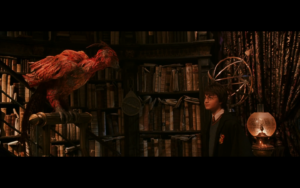 Although, like the first book, Chamber of Secrets is largely-stand alone, it does expand the Wizarding World. The underlying social tensions that gave rise to Voldemort are brought into the light, with the conflict between purebloods and muggleborns being made clear. (It’s even possible there are several logical reasons for this.) Draco mouths petty insults at Hermione – and, like before, he comes off as a pathetic brat – but there are clearly more dangerous issues at play. Discrimination against half-breeds like Hagrid is merely the tip of the iceberg. Rowling was smart, in my opinion, to put these details in the second book. We had enough time to get used to the characters – and come to like them – so we could realise that such discrimination was wrong.
Although, like the first book, Chamber of Secrets is largely-stand alone, it does expand the Wizarding World. The underlying social tensions that gave rise to Voldemort are brought into the light, with the conflict between purebloods and muggleborns being made clear. (It’s even possible there are several logical reasons for this.) Draco mouths petty insults at Hermione – and, like before, he comes off as a pathetic brat – but there are clearly more dangerous issues at play. Discrimination against half-breeds like Hagrid is merely the tip of the iceberg. Rowling was smart, in my opinion, to put these details in the second book. We had enough time to get used to the characters – and come to like them – so we could realise that such discrimination was wrong.
Chamber of Secrets also tells us something of Hogwarts’ foundation, centred on the conflict between Gryffindor and Slytherin. We are told that Slytherin left the school over the inclusion of muggleborn students, a statement that can be interpreted in multiple ways (but Rowling nor her characters do). For example, was Slytherin a racist? Or was he all-too-aware that witches and wizards were being hunted and inviting muggleborn students might lead to Hogwarts being betrayed and destroyed? There is a fundamental difference between an unthinking prejudice and a thinking prejudice and I’m tempted to declare that Slytherin had the latter. He certainly made no (recorded) attempt to attack the school he helped build, after he left. But Rowling doesn’t tell us enough to be sure.
It also includes a great deal of foreshadowing. The diary itself, of course, would prove to be something far worse in Half-Blood Prince. The social problems plaguing the Wizarding World are clearly illustrated, as is the lack of actual justice in a society more concerned with appearances than reality. Dumbledore’s blunders in this book foreshadow his later, far more disastrous, mistakes. And, on a more personal scale, Rowling neatly foreshadows just why Percy Weasley will leave his family, while – at the same time – illustrating that Percy is not actually a bad person. Stronger people than Percy have snapped under relentless teasing and bullying from their siblings.
Chamber of Secrets is still a children’s book. The problems I mentioned above are childish problems, the sort that delight children even as they horrify adults. Indeed, there is an innocence about the first two books in the series that is quite charming. That, I’m afraid, is about to change.

Leave a comment